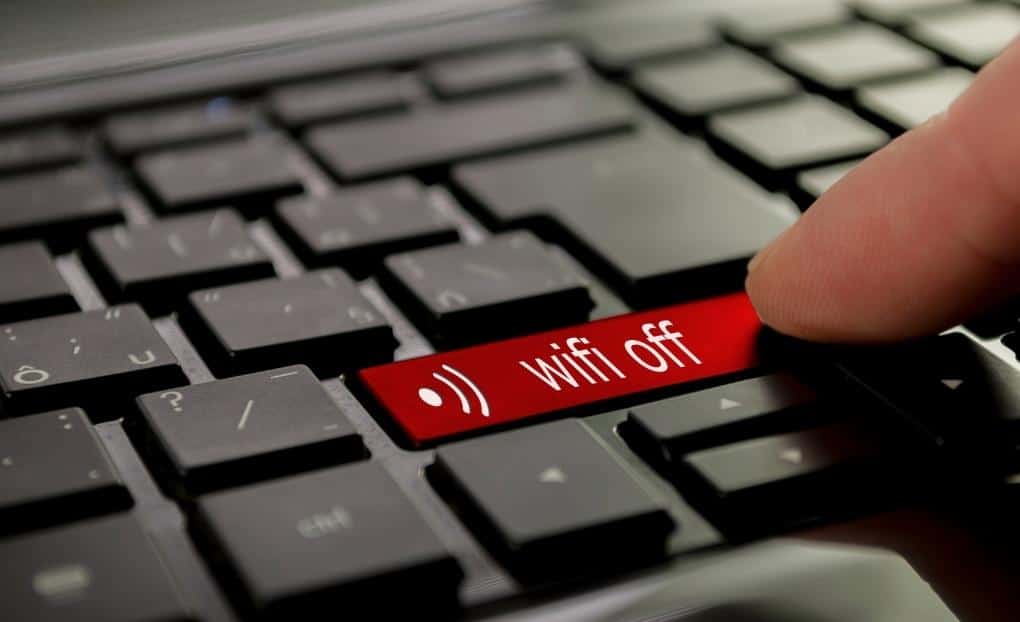
How To Turn Off WiFi?
Do You wondering how to turn off your WiFi or Ethernet connection in an easy way?
We are used to being constantly online and enjoying the benefits of internet content. However, sometimes there’s a need to disconnect from the Internet for security or other reasons. There’s a physical way to remove the LAN cable from the network card or remove the WiFi network adapter. Unlike a network cable, a WiFi adapter isn’t easy to pull off on laptops.
Unfortunately, Microsoft hasn’t yet implemented a simple solution to this problem. The average user is left to fend for himself, relying on third-party utilities.s. However, another solution doesn’t force you to install various software solutions. We will use Windows system tools to make a relatively elegant solution for turning the internet connection on and off.
The first step is to determine which network devices you have on your computer and which ones you use for your Internet connection. So it can be a WiFi or Ethernet (wired) connection.
Create a shortcut to turn off the WiFi internet connection
1. Open the Run box with Windows + R. Type ncpa.cpl and press Enter.

2. The Network Connections window will open to see all your network adapters and the ones currently connected to the Internet. In my case, the WiFi internet connection is via Wi-Fi 4. Once you’ve memorized your internet connection, minimize this window and move on to the next step.

3. Right-click on an empty part of the desktop and select New – Shortcut from the context menu.

4. In the shortcut’s name, enter the following: C:\Windows\System32\netsh.exe interface set interface “WiFi 4” disable and click Next. Note that you enclose the name of your connection in quotes, which in my example is “Wi-Fi 4”. As I pointed out, see the exact name of your internet connection in the Network Connections window, which I mentioned in step 2.

5. When you click Next, enter a shortcut name. I put Turn OFF WiFi, although you can put anything that suits you and is associated with the interruption of the internet connection. Then click Finish, and you will create your shortcut on the desktop.

6. Now, there is a new shortcut on the desktop. Proper functioning of the shortcut, i.e., deactivating the Internet connection, requires administrator privileges. Do the following: Right-click on the shortcut and select the Properties option from the drop-down menu.

7. Select the Shortcut tab, then click Advanced. In the new dialog box, check the Run as administrator option. Confirm OK to close the Advanced Properties dialog box. Click Apply and then OK in the Turn OFF WiFi Properties window. This way, your shortcut to deactivate your internet connection is ready. Don’t test this shortcut again until you have created a shortcut to turn on the WiFi connection.

Create a shortcut to turn on the WiFi internet connection
The procedure for creating a shortcut to turn on a WiFi internet connection is the same as turning it off. Create a new desktop shortcut and type the following:
C:\Windows\System32\netsh.exe interface set interface “WiFi 4” enable like in the picture below.

All other steps are identical to creating a shortcut to turn off a WiFi internet connection. Now that you’ve created shortcuts for turning WiFi on and off, you can test them to see if they work. If something is wrong, recheck the procedure to ensure you didn’t accidentally make a typo or skip a step.
When everything works properly, we move on to the next step, the visual appearance of shortcuts. We don’t want shortcuts to look generic after creating them:
1. Right-click on the shortcut, Turn OFF WiFi, and select the Properties option from the drop-down menu. (like step 6 in the previous topic)
2. Select the Shortcut tab, then click the Change Icon. In the new dialog box, select an icon from the list. Confirm OK to close the Change Icon dialog box. Click Apply and then OK in the Turn OFF WiFi Properties window. In the same way, select the desired icon for the second shortcut – Turn ON WiFi.

3. In the end, your shortcuts look like the following. I used system icons, but you can put yours from the archive on your hard drive, SSD, DVD, etc. In this case, click the Browse button in the Change Icon dialog box (in step 2).

Conclusion
Microsoft didn’t find it appropriate to create an easy way to turn the Internet on and off, and it’s up to you to do so manually or through many utilities. Utilities are good, but by installing them, you can only “pollute” the Windows registry and, over time, only slow down Windows if you install third-party programs for every “little thing.”
This article showed that you could easily use only what Windows already has from its tools. You can turn off and on WiFi or Ethernet Internet connection in the described way. I hope this article will help you learn something new if you haven’t already.
If you have any questions or suggestions, don’t hesitate to leave a comment.
